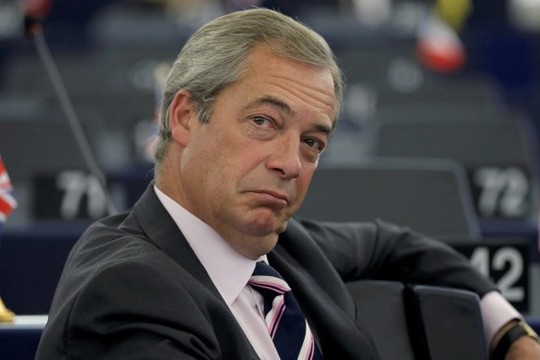Nigel Farage
Photo: ‘The Financial Times’
Like in the late-stage USSR, the British managerial class sticks rigidly to ideology in defiance of reality, ‘The Telegraph’ notes.
Britain’s managerial class increasingly resembles that of the Soviet Union in the early 1980s. They know that change is coming, but they’re doing their utmost to ignore the fact as best they can, for as long as they can.
Waiting in the wings is Nigel Farage, poised to play the role of Britain’s Gorbachev.
Like the USSR of the early 1980s, political rigidity and borderline terror at the idea of questioning obsolete dogma infects almost every corner of institutional Britain.
And one man has made it his mission to instigate a generational clearing out of the corridors of power; to remove those who see their roles as obstacles to change and as defenders of official orthodoxy.
What sets Farage apart in the eyes of his supporters is his suggestion that the Government can actually do things, and that if something gets in the way, it can be removed. This is in stark contrast to either of the two main parties.
Labour in particular seem so hemmed in by ideological conformity that they are unable even to think about the nature of the problems facing the country, let alone address them.
All of their policy suggestions sound like helpless tinkering that will make things worse – such as Rachel Reeves reportedly considering levying National Insurance on rental income, or the giving of a sort of automatic temporary asylum to people from Afghanistan or Syria.
The Tories on the other hand, were hamstrung by their timid acceptance of the fact that certain things were simply politically off-limits. If the civil service said that the Supreme Court wouldn’t allow it, then it couldn’t be done, and that was that.
The contrast was emphasised by Reform UK’s dramatic unveiling of a toughened-up policy platform on immigration and deportation on Tuesday. Though it prompted a flurry of criticism, both from establishment commentators and from others on the Right who said it was ill-thought through and shallow, its blunt, brash messaging landed with core supporters.
This Gorbachev analogy works nicely, in as far as Nigel Farage appears to be offering a British Glasnost. A political opening up that allows the state to navigate problems as they exist in reality, without being constrained by theoretic orthodoxies. For us, Human Rights law has been playing the role of Marxism-Leninism.
But beyond immigration policy, the public finances need to be dealt with. While Farage’s Glasnost is likely to be popular with a large swathe of the electorate, he will have to accompany it with a British Perestroika; wrenching economic reforms that will be popular with pretty much nobody.
By 2029, Britain’s period of productivity stagnation will have gone on for longer than that of the Brezhnev era, and some bold supply side reforms will do it a power of good.
But at some point, a Reform government will need to untangle the bewildering array of benefits, entitlements, cross-subsidies and needs-based pricing that have effectively cancelled the free market in Britain, and created a burden that is far too great for the tax-paying public to bear.
All of this is going to pose existential questions about what the British state itself is for, and whom it exists to serve. This will challenge underlying assumptions going back to 1945, let alone those of 1997 – assumptions that are as dear to Reform supporters as they are to the current nomenklatura. In the sour political atmosphere that follows, people are likely to look for answers in the form of even deeper radicalism on questions of identity and belonging – the like of which Farage has always firmly resisted.
Like Gorbachev, Farage may find himself desperately trying to hold together a system that he has spent his career trying to shake up, as economic and political forces beyond his control finish the work he began.
If that is the case, the only remaining question is: where will Britain’s Putin emerge from?
Is Britain about to experience its own Perestroika?
read more in our Telegram-channel https://t.me/The_International_Affairs

 11:00 07.09.2025 •
11:00 07.09.2025 •























